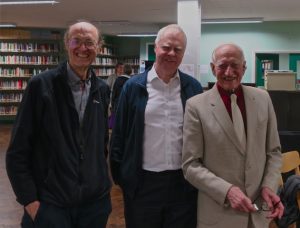
Chris Rowland, Stuart Jordan, and John Vincent Re-united!
‘UTU’s Contribution to British Adult Christian Education’ was the theme of the UTU Colloquium on 8th November 2017, when 10 of us met with two UTU members of forty years’ standing who came up from Cambridge for a celebratory occasion of recollection and discernment.
Revd Prof. Christopher Rowland was Professor of the Exegesis of Holy Scripture at Oxford University until 2016. Revd Dr Stuart Jordan is Chair of Trustees at Wesley House, Cambridge.
Below is a summary of the conversation that is leading us to a renewed partnership with old friends and with Wesley House in Cambridge.
Chris Rowland began by recalling how and why he came to work with UTU, and with John. Chris was just back from studying Base Ecclesial Communities in Brazil in 1983 and was looking for similar phenomena in the UK.
Neville Black and UTU were already doing a theological and ministerial training in the urban context in ways that resonated with a Liberation theology approach.
UTU helped Chris to see that all theology is contextual, including academic theology. UTU offered a witness to the value of contextual theology and theological reflection. This is mainstream now but was a pioneering approach at the time.
For Chris, the Oxford MTh in Practical Theology followed, embodying many UTU insights. Chris’s joint work on publications with John helped create a British Liberation Theology – a series continuing in Radical Christianity.
Stuart Jordan recalled that his 1960s teenage year with John’s Rochdale Community led to ordained ministry. Today Secular Christ (available at UTU) is still foundational for him: ‘I have not gone beyond it.’
At present Stuart is aware of, ‘the shortage of places now where you can see this theology in action – creation of and theological reflection on projects.’
‘In London for thirty years, we were alongside rather than of people in poverty. Community involvement brought freedom from church control.
‘We relate to what are the strands of urban life today’ Wesley House Cambridge is now a centre for international cross cultural theological work, but not the urban.’
‘We need for UTU and Wesley House to collaborate and share insights.’
UTU Chair of Trustees, Erica Dunmow commented that it is an academic ‘mindset now that people write from context’.
Chris commented that the theology has not yet changed: ‘We need deeper contextual Biblical study, with Biblical study from the context. We are still, with the exception of Unlock’s methodology, largely stuck with the traditional liberal methods.’
UTU member and urban minister, Steve Millwood said ‘[theology] is all middle class’; though there were, said Erica, Pentecostals and Catholics particularly from the working class who study, and lay people on mission and evangelism courses.
After a wide-ranging discussion on urban discipleship, Chris thought this all pointed to the importance of pedagogy – finding spaces for different perspectives and orientations.
Stuart felt we needed to find ways and places for: ‘making available experiences’
John felt that they have to be experiences in appropriate contexts, ‘So we need still to create educational opportunities within marginal contexts, and learn there beside fellow practitioner-theologians.’
UTU Director, Keith Hebden concluded that the UTU, as a Union of people as well as a Unit where theological reflection happensis opening up new ways and opportunities for new disciples to encounter these things.
Since this meeting Keith has been to visit Wesley House and met up again with Chris and Stuart. We look forward to seeing how we might work together to champion contextual and urban ministry.



